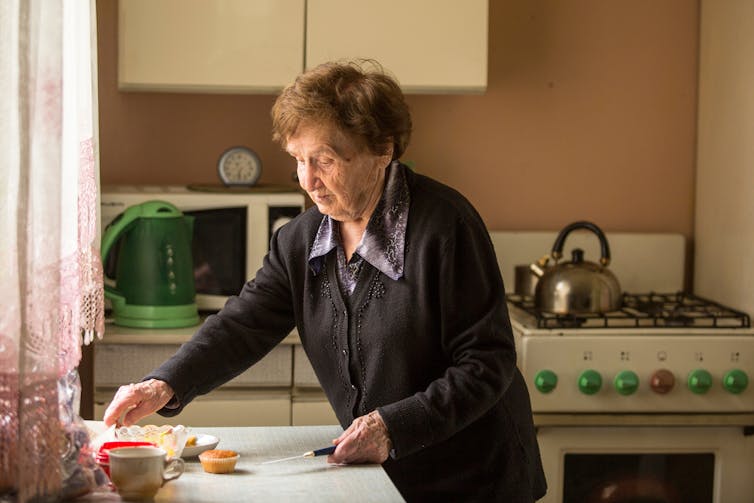No Family Member to Stay in Hospotal Room With Dementia
People with dementia go into emergency hospitals more often than the balance of the population fifty-fifty though these hospitals are run as if every patient has perfect intellectual function. An acute hospital is like a meat grinder for people with dementia – it chews them up and spits them out – so it is worth both fugitive admission in the beginning place, and learning how to support someone if admission is actually necessary.
Your local hospital might be prepared to welcome people with dementia but you can't be sure. Its management would exist wise to practise so, as upward to fifty% of patients, on top of their illness or injury, may be elderly and frail and afflicted by either dementia or delirium. Delirium is a reversible state of confusion acquired by stress and infection. If staff work to reduce delirium, information technology nearly certainly besides helps reduce problems associated with dementia.
Slippery slope
How we regard hospitals has developed over time. What was a costly assiduities for our peachy-grandparents is at present understood equally a regular service. A building that was once viewed with dread because and then many people died there is now seen as a desirable place to go treated. People battle against local infirmary closures. They attend accident and emergency (A&E) in preference to going to run into the GP, as if the hospital was superior.
But if old people with dementia can stay out of hospital, it's much better. Of course, some things can't exist managed outside a hospital but for many, getting admitted is the top of a slippery slope. They may have been managing perfectly well at home, simply during their hospital stay things happen that hateful they never get home again.
Dementia patients are twice as probable to suffer preventable complications such as pressure ulcers and pneumonia in hospital. Patients with dementia and a fractured hip tend non to be given as much hurting relief as other patients with fractured hip. Uncontrolled pain in dementia gives rise to delirium that is often undiagnosed and untreated in hospitals. As a result, half of these patients who develop delirium dice in six months.
Patients with dementia may go missed by accident at mealtimes and accept issues eating and drinking which are made worse in hospital. Some hospitals provide guidance but bad stories are more mutual.
Coping worse in hospital
Research shows that if you have dementia yous will stay in hospital longer than other people with the same clinical problem. People ofttimes say that after admission it was discovered that they had not been coping at dwelling. Just in fact, information technology may be the opposite. A person who does non get enough to eat in infirmary may take been eating adequately at abode. The person coping on their own with washing and going to the toilet in a familiar home environment may not be able to negotiate the defoliation of the ward and start to wet themselves and be unable to keep themselves clean.
Someone who managed to exist happy and live quietly at home, sleeping at night and entertaining themselves by 24-hour interval, will exist kept awake past noise and calorie-free at night, and bored rigid in the daytime, never even seeing daylight. Getting the lighting right can foreclose major dementia symptoms such as mood swings, sleep problems, and behavioural bug.

And then when they go noisy and irritable they may exist given dangerous anti-psychotic medication in the outset example to quieten them down. Information technology is not unusual afterward this to have a fall or a fracture, causing a longer flow in infirmary during which patients tin then develop low and delirium, leading to early decease.
This is a terrible human story. And it's terrible financially too. Staying longer in hospital than others with the same condition makes for a greater tax burden and causes waiting lists. Social services are under pressure now to discover care home places for people, when what they had earlier was a semi-independent person who mainly looked after themselves with a flake of abode care. The family unit, if there is one, and the estate of the person at present face the probability of having their assets stripped to pay for a situation that may have been avoidable or at least delayed for months and years.
Families tin can do more
Logically families should accept more responsibility for intendance of elderly relatives while in a hospital. Be there to assistance them eat, and to help them with washing, keeping them company and making sure that they swallow their medication.
Just hospital staff resist information technology. For political reasons the NHS has difficulty accepting a situation like this for fear of accusations that the organization is failing. But recommending help from families has in the past been misrepresented in the media or by politicians equally an attack on the NHS.
This is because we have been led to believe an unreal fantasy of what hospitals can exercise. Recommending that families help is not a criticism but a applied response. If families support the frail person in infirmary, it helps the nurses, reduces delayed discharges, saves coin and maintains the nobility of the patient. Everyone wins. Nosotros must all do information technology out of aware cocky-interest to allow the organization to focus on patients who take no-one and zilch.
The alternative is that we assume hospitals can do everything we expect for an ageing and increasingly frail patient group. That in itself is enough to pb to system failure, because we enquire also much of them.
Source: https://theconversation.com/why-hospitals-are-dangerous-for-people-with-dementia-and-why-its-up-to-families-to-help-38738
0 Response to "No Family Member to Stay in Hospotal Room With Dementia"
Post a Comment